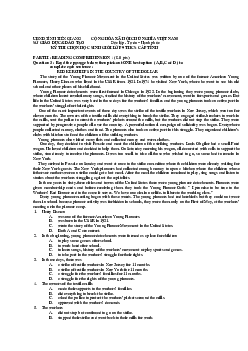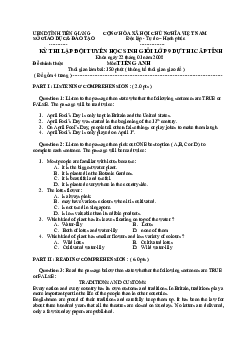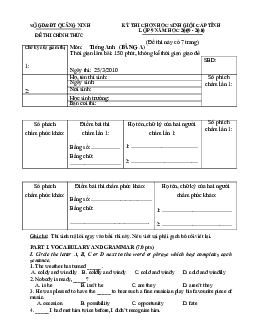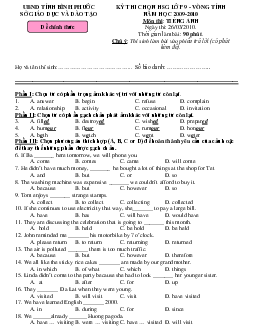









Preview text:
ĐỀ THI GIAO LƯU HỌC SINH GIỎI LỚP 9 CẤP ĐỀ THI CHÍNH THỨC TỈNH Số báo danh Năm học: 2018 - 2019 .................... MÔN: TIẾNG ANH
Ngày thi: 22 tháng 2 năm 2019
Thời gian: 150 phút (không kể thời gian giao đề)
Đề thi này gồm có 06 trang
Họ tên thí sinh: ......................................................Phòng thi số:..........Số báo danh:.............
SECTION A. LISTENING: (15 pts)
There are two parts in this section. You will hear each part twice. After each part, you will
have a fifteen-second pause to do.
Part 1. Questions from 1 to 5.
Listen to Duncan talking to a friend about a tennis course. Choose the correct answer for each
of the following questions. You will hear the conversation twice.
1. Duncan stayed in a hotel________. A. in a town B. near the sea. C. in the mountains
2. Duncan’s teacher comes from ________. A. England B. France C. Canada
3. How much did Duncan pay for the course? A. £185 B. £205 C. £265
4. Before the course, Duncan bought himself some tennis ________. A. shoes B. clothes C. balls
5. On the last evening, there was ________. A. a party B. a film show C. a tennis match
Part 2. Questions from 6 to 15.
You will hear a woman calling a local museum about children's art and craft workshops.
Complete the notes below. Write no more than ONE words, or numbers for each blank.
CHILDREN'S ART AND CRAFT WORKSHOPS
• Workshops organised every: (6) .....................................
• Children below (7) .....................................years of age are accompanied by an adult.
• Cost: £ (8) .....................................per child
• Workshops held in: Winter House, on (9) ..................................... Street
• Security device: must push the (10) ..................................... button to open door
• Should leave car at the back of the (11) .....................................
• Book workshops by calling the (12) ..................................... department (on 200765) * Next two workshops Date Workshop title
Children advised to wear:
Please bring (if possible): 16/11 Building castles
(13) old ............................................... bottle tops 23/11
(14) ..................................... Worlds Nothing special
(15) ..................................... paper
PART B: PHONETICS (5 pts)
Question I: Choose the word whose underlined part is pronounced differently from the rest in the same line. (2 pts) 16. A. think
B. negotiation C. invent D. enlarge 17.A. naked B. coughed C. hatred D. sacred 18..A. curriculum B. particular C. flexible D. economics
Question II: Find the word with the stress pattern different from that of the other three
words in each question. (3 pts)
19: A.correspond B.recreation C.museum D.entertainment 20: A. information B. contaminate C. mathematics D. politician
PART C.LEXICO – GRAMMAR ( 30 pts)
Question1 : Mark the letter A, B, C, or D on your answer sheet to
indicate the correct answer to each of the following questions.
21. Like many other countries in the world, Vietnam is “on the _____”. A. progress B. start C. begin D. move
22. Turn off this machine, please. The harsh sound really ________ me crazy. A. takes B. worries C. drives D. bothers
23. As soon as you hear the alarm, you all have to leave the building ________. A. on the verge B. under law C. at no time D. without delay
24. Jane really loves the ______, jewelry box that her parents gave her as a birthday present. A. wooden brown nice B. nice wooden brown C. brown wooden nice D. nice brown wooden
25. Those ballpoint pens are made in a large _____ of colors and styles. A. series B. range C. collection D. network
26. Of the ten beauty spots my brother visited, _____ left a lasting impression on him. A. none of which B. not one of them C. which none D. and none of them
27. - Minh: “My first English test was not as good as I expected.” - Thomas: “________.” A. Good Heavens! B. Never mind. Better job next time! C. That’s brilliant enough.
D. It’s okay. Don’t worry.
28. ___________ appears considerably larger at the horizon than it does
over head is merely an optical illusion.
A. The Moon B. The Moon which C. When the Moon D. That the Moon
29.When she _____ she found herself in hospital. A. came round
B. came back C. came over D. came out
30._____ in Paris before, he didn’t know his way around when he took his family there. A. Not be living B. Never having lived C. His not living D. Because he has lived
Question 2 .Use the correct form of the word in brackets to complete each sentence.
31. The Wright brothers’ success ....................... the significance
beginning of a new transportation. 32. Daily attend
..................................... of classes is desirable, if not compulsory.
33.His record as a show-jumper is ....................... equal
34........................fruit juice contains no extra sugar. Sweet
35.In nursing, women tend to ……..…. men by four to one. NUMBER
36.My uncle is a keen amateur ……………………… nature
37. The mechanic …………………fixed our car , which really upset us . profession
38. His main.......................at that time was getting enough occupy to eat.
Question 3: Complete the sentences ( or exchanges) by supplying the
correct form of the verbs in brackets (10
39.It is recommended that he ( take)………….a gallon of water with him if he hikes to the bottom of the Grand Canyon.
40.Don’t let him play with scissors in case he (cut) ………………..himself.
41.Had he followed my advice before, he (not be) ………………..in danger now.
42+43 . (Worry)…………… about what he (hear)……………, John telephoned his brother.
44. The news left me (wonder) ………………what would happen next.
45. It’s a pity you didn’t ask because I (help) …………..you.
46. Last month prices went up, but this month they (fall) …………… a little.
Question 4: Each of the following sentences has an error. Find the errors and correct them.
47. The sick needs to be looked after. So money must be spent on hospitals.
48. There's hardly no sugar left, so we must get some when we go shopping
49. My brother attends an university in the Midwest which specializes in astrology.
50. Each of the members of the group are made to write a report every week.
SECTION D: READING ( 30 pts)
Question1. Read the passage below and choose the best answer to each question.
Speech is one of the most important (51) ________ of communicating. It consists of far more
than just making noises. To talk and also to (52) ________ by other people, we have to speak a
language, that is, we have to use combinations of (53) ________ that everyone agrees to stand for a
particular object or idea. Communication would be impossible if everyone made up their own
language. Learning a language properly is very (54) ________. The basic (55) ________ of English
is not very large, and not only about 2,000 words are needed to speak it quite (56) ________. But
the more idea you can (57) ________ the more precise you can be about their exact meaning.
Words are the (58) ________thing we use in communicating what we want to say. The way we (59)
________ the words is also very important. Our tone of voice can express many emotions and (60)
________ whether we are pleased or angry, for instance. 51. A. reason B. tests C. rules D. ways 52. A. be spoken B. be examined C. be understood D. be talked 53. A. systems B. sounds C. languages D. talks 54. A. easy B. important C. simple D. expensive 55. A. grammar B. word C. vocabulary D. structure 56. A. fluent B. good C. perfect D. well 57. A. need B. grow C. express D. pass 58. A. main B. certain C. full D. most 59. A. talk B. say C. pass D. send 60. A. show B. ask C. understand D. know
Question2. Read the passage below and choose the best answer to each question
It is estimated that over 99 percent of all species that ever existed have become extinct.
What causes extinction? When a species is no longer adapted to a change environment, it may die.
The exact causes of a species’ death vary from situation to situation. Rapid ecological change may
render an environment hostile to a species. For example, temperatures may change and a species
may not be adapt. Food resources may be affected by environmental changes, which will then
cause problems for a species requiring these resources. Other species may become better adapted to
an environment, resulting in competition and, ultimately, in the death of a species.
The fossil record reveals that extinction has occurred throughout the history of Earth. Recent
analyses have also revealed that on some occasions many species became extinct at the same time -
a mass extinction. One of the best - known examples of mass extinction occurred 65 million years
ago with the demise of dinosaurs and many other forms of life. Perhaps the largest mass extinction
was the one that occurred 225 million years ago, when approximately 95 percent of all species
died. Mass extinctions can be caused by a relatively rapid change in the environment and can be
worsened by the close interrelationship of many species. If, for example, something were to happen
to destroy much of the plankton in the oceans, then the oxygen content of Earth would drop,
affection even organisms not living in the oceans. Such a change would probably lead to a mass extinction.
One interesting, and controversial, finding is that extinctions during the past 250 million
years have tended to be more intense every 26 million years. The periodic extinction might be due
to intersection of the earth’s orbit with a cloud of comets, but this theory is purely speculative.
Some researchers have also speculated that extinction may often be random. That is, certain
species may be eliminated and others may survive for no particular reason. A species’ survival may
have nothing to do with its ability or inability to adapt. If so, some of revolutionary history may
reflect a sequence of essentially random events.
61. The word “it” in line 2 refers to ________. A. environment B. species C. extinction D. 99 percent
62. What does the author say in paragraph 1 regarding most species in Earth’s history?
A. They have been able to adapt to ecological changes.
B. They have caused rapid change in the environment.
C. They have remained basically unchanged from their original forms
D. They are no longer in existence.
63. Which of the following is NOT mentioned in paragraph 1 as resulting from rapid ecological change?
A. Availability of food resources
B. Introduction of new species C. Temperature changes
D. Competition among species
64. The underlined word “ultimately” is closest in meaning to ________. A. exceptionally B. unfortunately C. finally D. dramatically
65. According to paragraph 2, evidence from fossils suggests that ________.
A. There has been only one mass extinction in Earth’s history.
B. Extinction of species has occurred from time to time throughout Earth’s history.
C. Extinctions on Earth have generally been massive.
D. Dinosaurs became extinct much earlier than scientists originally believed.
66. The word “demise” is closest in meaning to________. A. help B. death C. recovery D. change
67. According to the passage, it is believed that the largest extinction of the species occurred________.
A. 65 million years ago
B. 250 million years ago
C. 225 million years ago D. 26 million years ago
68. Why is “plankton” mentioned in the second paragraph?
A. To emphasize the importance of food resources in preventing mass extinction
B. To illustrate a comparison between organisms that live on the land and those that live in the ocean
C. To point out that certain species could never become extinct
D. To demonstrate the interrelationship of different species
69. The underlined word “finding” is closest in meaning to ________.
A. published information B. research method C. scientific discovery D. ongoing experiment
70. Which of the following can be inferred from the theory of periodic extinction mentioned in paragraph 3?
A. The theory is no longer seriously considered.
B. Most scientists believe the theory to be accurate.
C. Many scientists could be expected to disagree with it.
D. Evidence to support the theory has recently been found.
Question3: Read the text and think of the word which best fits each gap.
The world’s oceans are so vast that they can cope (71) .................................. the present levels of
pollution. However, little is known about the long-term effects of such slow poisoning. The (72)
.................................. serious problem of modern times is that man is destroying the earth’s (73) ..................................
resources and transforming huge areas into wasteland. As a (74) .................................., it is becoming
extremely difficult to grow (75) .................................. to feed the world’s rapidly increasing population. A
way of (76) .................................. all the wildlife on the earth must also be found as many species are in (77)
.................................. of disappearing completely from the face of the earth. The dangers, however, are not
confined solely to the land and the sea. for (78) .................................., the smoke in the atmosphere is
increasing so (79) .................................. that the amount of sunlight has been reduced in many cities. Man’s
whole environment is (80) .................................. changed in a serious way.
SECTION E. WRITING ( 20 pts)
Question1: Finish each of the following sentences in such a way that it means the same as the sentence printed before it.
81. Why were you so impatient in such a situation?
-You are supposed………………………………………………..……………………………………
82.It’s hardly possible to reach the peak of the mountain.
- It’s nearly ……………………………………………
83.I wish you hadn’t breathed a word about his private life to anyone.
- I would like you……………………………………………
84. Jane has a habit of working hard. - Jane
is.................................................................................................................. ........
85.Celia had no other alternative but take a huge loan from the bank.
-The only ……………………………………………
Question2: Complete the second sentence so that it has a similar meaning to the first one,
using the given word. Do not change the given word.
86. His arrival was completely unexpected. (TOOK)
→His …………………………………………………………
87.I think we ought to permit him to do whatever he chooses. (HAND)
→I think ……………………………………………………
88. I haven’t decided yet whether to move or not. (made)
I haven’t ………………………………………………..………………………. whether to move or not yet.
89. They have postponed the match until the end of August. (put)
The match………………………………………………..………………………. until the end of August.
90. George never pays any attention to his father’s advice. (notice)
George ………………………………………………..…………………………. of his father’s advice.
Question3: Paragraph writing.
With around 150 words, write a paragraph to talk about the benefits of students doing volunteer work. --- THE END ---
HƯỚNG DẪN CHẤM MÔN: TIẾNG ANH
Ngày thi: 21 tháng 2 năm 2019
Thời gian: 150 phút (không kể thời gian giao đề)
Đề thi này gồm có 04 trang
SECTION A. LISTENING: (15 pts)
SECTION I. LISTENING. (3 points – 0.2/each)
Part 1. Questions from 1 to 5. (1.0 points - 0.2/each)
Listen to Duncan, talking to a friend, about a tennis course. Choose the correct answer for
each of the following questions. You will hear the conversation twice.
1. C. in the mountains 2.C. Canada 3. B. £205 4. A. shoes 5. A. a party
Part 2. Questions from 6 to 15. (2.0 points - 0.2/ each)
You will hear a woman, calling a local museum, about children's art and craft workshops.
Complete the notes below. Write no more than TWO words, or numbers for each blank.
CHILDREN'S ART AND CRAFT WORKSHOPS
• (6) Saturday
• (7) 8 / eight (8) 2.50 (9) Tamer (10) green (11) library (12) education * Next two workshops Date Workshop title
Children advised to wear:
Please bring (if possible): 16/11 Building castles (13) old clothes bottle tops 23/11
(14) Undersea Worlds Nothing special
(15) silver paper
PART B: PHONETICS (5 pts)
Choose the word whose underlined part is pronounced differently from the rest in the same line. (2 pts) 16. A. think 17. B. coughe d 18. C. flexible
Question II: Find the word with the stress pattern different from that of the
other three words in each question. (3 pts) 19: A.correspond 20: B. contaminate
Part 1: Questions from 16 to 35. 21. D. move 22. C. drives
23. D. without delay
24. D. nice brown wooden 25. B. range 26. B. not one of them
27. B. Never mind. Better job next time! 28. D. That the Moon 29.A. came round 30.B. Never having lived
Part 2. Questions from 36 to 45. 31.signified 32.attendance 33.unequalled 34. unsweetened 35.outnumber 36.naturalist 37.unprofessionally 38.preoccupation
II. Supply the correct form of the verb in brackets(10 points). 39. take 40.cuts 41.wouldn't be 42+ 43.Worrying-had heard 44.wondering 45 could have helped 46. are falling
Each of the following sentences has an error. Find the errors and correct them.
47. The sick needs to be looked after. So money must be spent on hospitals. needs-> need
48. There's hardly no sugar left, so we must get some when we go shopping. ->hardly any / no
49. an => a university
50. Each of the members of the group ar
e made to write a report every week. is c. READING QUESTION :1. 51. D. ways 52. C. be understood 53. B. sounds 54. B. important 55. C. vocabulary 56. D. well 57. C. express 58. A. main 59. B. say 60. A. show
QUESTION :2. Read the passage below and choose the best answer to each question
61. B. species
62. D. They are no longer in existence.
63. B. Introduction of new species 64.C. finally
65. C. Extinctions on Earth have generally been massive. 66. B. death
67. C. 225 million years ago
68.D. To demonstrate the interrelationship of different species
69. C. scientific discovery
70. C. Many scientists could be expected to disagree with it.
QUESTION :3: Questions 76 – 85. (2.0 points- 0.2/ each)
Read the text and think of the word which best fits each gap. (71) with (72) most (73) natural (74) result, (75) enough
(76) protecting/ saving/ preserving
(77) danger
(78) example / instance (79) much (80) being
SECTION d. WRITITNG (4 points)
Part 1: Questions 86 – 90. (1 point- 0.2/ each)
Finish each of the following sentences in such a way that it means the same as the sentence printed before it.
81. You are supposed to have been patient in such a situation.
82.It’s nearly impossible to reach the peak of the mountain.
83.I would like you not to have breathed a word about his private life to anyone.
84.Jane is used to working hard.
85.The only alternative (that) Celia had was to take a huge loan from the bank.
Part 2: Questions 91 – 95. (1 point - 0.2/ each)
Complete the second sentence so that it has a similar meaning to the first sentence, using the
word given. Do not change the given word.
86. →His arrival took us completely by surprise.
87.→I think we should give him a free hand.
88. I haven’t made up my mind whether to move or not yet.
I haven’t made a decision whether to move or not yet.
89. The match has been put off (by them) until the end of August.
90. George never takes (any) notice of his father’s advice.
George takes no notice of his father’s advice.
George doesn’t take (any) notice of his father’s advice.
Part 3: Paragraph writing. (2.0 points) Part 3: ( 10.0 đi ểm) - cụ thể như sau:
- Nội dung (content): 5 điểm
- Từ vựng (vocabulary): 1.5 điểm
- Ngữ pháp (grammar): 1.5 điểm
- Tính mạch lạc và trôi chảy (coherence and cohesion) + độ dài (length): 2.0 điểm
- Sai dưới 4 lỗi không trừ điểm.
- Sai trên 4 lỗi, hoặc sai những lỗi nặng trừ 1.0 điểm/1 lỗi.
B- Hướng dẫn chấm:
- Tổng điểm toàn bài: 100 points Mỗi câu đúng được 1.0 điểm - Thang điểm : 20
Tổng những câu, từ làm đúng - Điểm bài thi = 5 …




